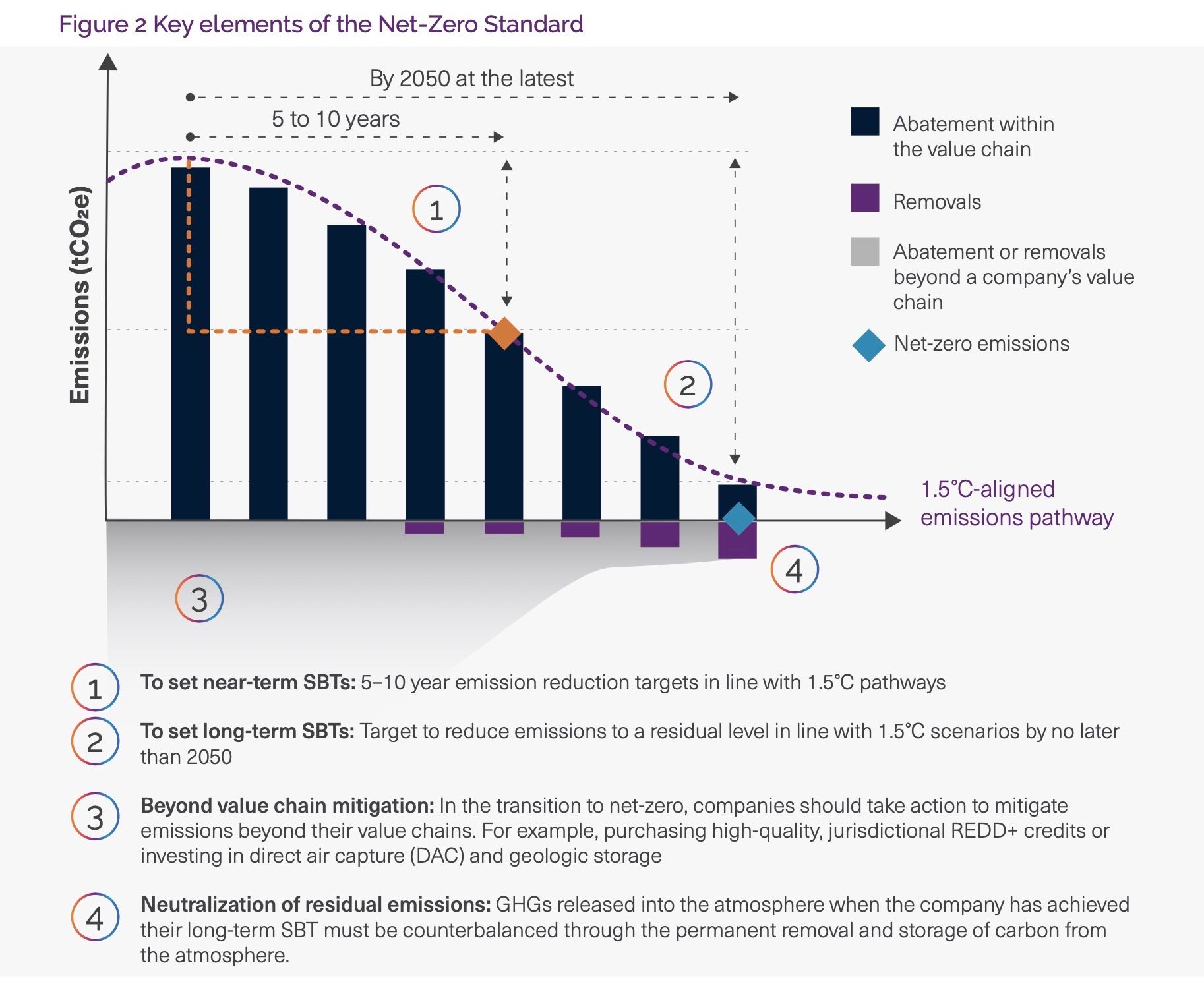By 2023, almost 4,000 businesses and financial organisations have established goals for reducing their greenhouse gas emissions that have been validated by the Science-based Targets Initiative (SBTi). This initiative, created in 2015 by the Carbon Disclosure Project, the United Nations Global Compact and the World Resources Institute has the goal of assisting businesses in reaching the Paris Agreement's collective objective of keeping global warming to 1.5°C by 2050.
In order to accomplish this, the "Net Zero-Standard" created by the SBTi lays out the four stages that companies must follow:
- Reducing emissions in their value chain in accordance with a short-term target (5 to 10 years);
- Reducing emissions in their value chain in accordance with a long-term target (from 10 years to 2050);
- Taking action to finance carbon sequestration and emission reduction projects outside their value chain (carbon contribution mechanism*);
- Starting in 2050, the "neutralization" of their residual emissions by funding projects to sequester their incompressible emissions outside their value chain (carbon contribution, but only on sequestration projects).

Reforest'Action provides nature-based solutions that help businesses meet the SBTi standard as part of its mission to assist businesses in transitioning to a regenerative model.
*Reforest’Action, like several other actors, prefers to use the expression “carbon contribution” rather than “carbon offsetting”, because it seems to us to be more accurate and more appropriate.
Prior to 2050, in the phase of emissions reduction
Reforest'Action provides customised regenerative agriculture projects, such as agroforestry, improved soil and crop management, and reducing the use of chemical inputs, for businesses whose value chain is connected to resources derived from living organisms (agri-food, textiles, perfumes and cosmetics, etc.). In certain situations, these methods also reduce greenhouse gas emissions associated with farming, in addition to increasing soil carbon sequestration.
As one of the solutions suggested by the SBTi, all companies can also help limit emissions outside their value chain by supporting certified REDD+ carbon projects. These projects aid in the preservation of existing tropical forests. In fact, the SBTi notes that "without safeguarding the planet's remaining tropical forests, there is currently no trajectory that allows us to stay below 1.5˚C.”Reforest'Action offers carbon credits from rigorously selected REDD+ projects that benefit from dual certification: VCS and CCB (or SD Vista) certification, which cover the carbon as well as the social and the environmental aspects. These projects generate numerous benefits, not only for the climate, but also for biodiversity and local communities.
For businesses looking to get involved in France, Reforest'Action offers agricultural and forestry projects that qualify for the Label Bas-Carbone (Low-Carbon Label), a label established by the French Ministry of Ecological Transition with the goal of highlighting the organisations contributing to the National Low-Carbon Strategy.
As 2050 draws near, in the "neutralization" phase of residual emissions
The SBTi will mandate that, by the latest in 2050, a company that has successfully reduced its emissions by 90–95% should "neutralize" the portion of its emissions that it is not technically feasible to reduce, through the carbon contribution mechanism. The idea of "neutralization" suggests the application of strategies that store carbon over an extended period of time, such as reforesting previously cleared land. To reach their "net zero" point, companies are supposed to contribute to sequestering as much carbon as they still emit into the atmosphere.
To address this issue, Reforest'Action gives businesses the possibility to fund the development of certified forest creation projects (VCS certification in particular), which will produce carbon credits after five years and for approximately 30 years. Although these projects come with a high cost, they have the benefit of allowing big businesses to purchase a set amount of carbon credits at a fixed price, preventing shortages and skyrocketing credit prices that could arise from increased demand for projects of this kind. Furthermore, Reforest'Action directly develops these projects in a number of tropical countries, working with local partners to guarantee operational execution and meticulous oversight.
Companies are specifically urged by the SBTi to "invest now in mitigation outside their value chains to help achieve societal net zero”. To put it another way, in order to contribute to the global +1.5°C target, businesses need to start supporting climate change mitigation projects outside their value chains (Beyond Value Chain Mitigation) right away. This could include long-term CO2 capture and sequestration projects as well as carbon contribution projects that prevent or minimise greenhouse gas emissions.
It is therefore by starting now to combine the reduction of their own emissions with the financing of projects that avoid emissions and sequester more carbon outside their value chain that companies will be able to implement climate strategies in line with the SBTi recommendations and equal to the climate emergency!